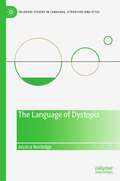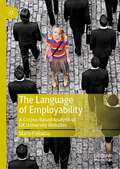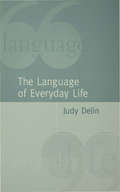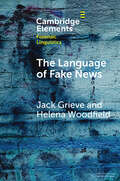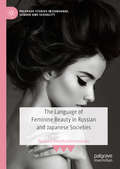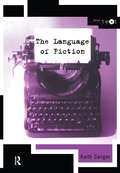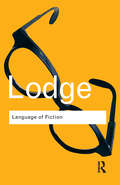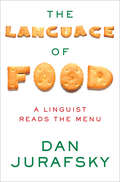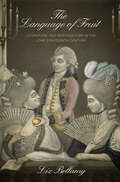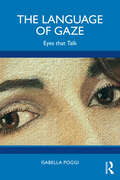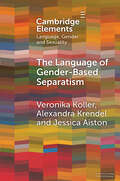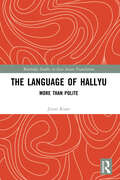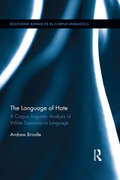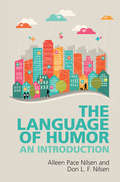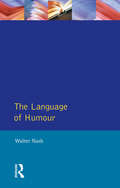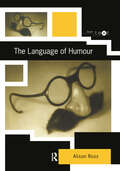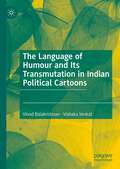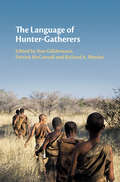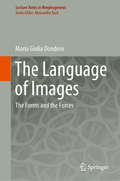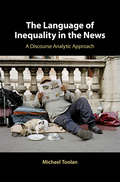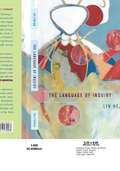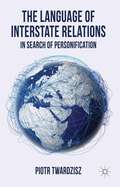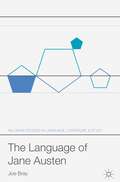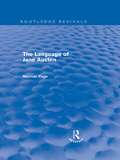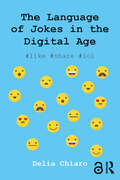- Table View
- List View
The Language of Dystopia (Palgrave Studies in Language, Literature and Style)
by Jessica NorledgeThis book presents an extended account of the language of dystopia, exploring the creativity and style of dystopian narratives and mapping the development of the genre from its early origins through to contemporary practice. Drawing upon stylistic, cognitive-poetic and narratological approaches, the work proposes a stylistic profile of dystopia, arguing for a reader-led discussion of genre that takes into account reader subjectivity and personal conceptualisations of prototypicality. In examining and identifying those aspects of language that characterise dystopian narratives and the experience of reading dystopian fictions, the work discusses in particular the manipulation and construction of dystopian languages, the conceptualisation of dystopian worlds, the reading of dystopian minds, the projection of dystopian ethics, the unreliability of dystopian refraction, and the evolution and hybridity of the dystopian genre.
The Language of Employability: A Corpus-Based Analysis of UK University Websites
by Maria FotiadouThis book employs a corpus-based Critical Discourse Analysis (CDA) methodology to analyse the language used by university careers services in the UK. Drawing on a corpus which includes the public-facing websites of careers services from 24 Russell Group and 34 Post-92 universities, the author highlights some of the potentially problematic 'common-sense' views and ideas that are currently promoted to students using these services. She argues that the language used by university websites promotes neoliberal ideology and encourages the denaturalisation of such language. This book will be of interest to linguists, sociologists, education scholars, and scholars who are otherwise interested in the notion of employability.
The Language of Everyday Life: An Introduction
by Judy DelinThis is a lively, practical guide that provides a fascinating linguistic description of six familiar text and discourse types, showing how language works in everyday life to perform its particular purpose. Through original examples, students are introduced to a wide-ranging repertoire of analytical concepts and techniques, described in basic, clear terms, and drawn from a broad range of areas of linguistics and language study. The aim of the book is to enable students to discover for themselves what is interesting about different language situations, and to begin to interrogate the relationship between language, society, and ideology. The Language of Everyday Life includes: topics for discussion; exercises, and; further readings; extensive glossary of technical terms; a practical guide to project work.
The Language of Fake News (Elements in Forensic Linguistics)
by Jack Grieve Helena WoodfieldIn this Element, the authors introduce and apply a framework for the linguistic analysis of fake news. They define fake news as news that is meant to deceive as opposed to inform and argue that there should be systematic differences between real and fake news that reflect this basic difference in communicative purpose. The authors consider one famous case of fake news involving Jayson Blair of The New York Times, which provides them with the opportunity to conduct a controlled study of the effect of deception on the language of a single reporter following this framework. Through a detailed grammatical analysis of a corpus of Blair's real and fake articles, this Element demonstrates that there are clear differences in his writing style, with his real news exhibiting greater information density and conviction than his fake news. This title is also available as Open Access on Cambridge Core.
The Language of Feminine Beauty in Russian and Japanese Societies (Palgrave Studies in Language, Gender and Sexuality)
by Natalia KonstantinovskaiaThis book conducts a cross-linguistic and cross-cultural study of 'women’s language' as it pertains to feminine beauty. It examines the ideological constructs of beauty and femininity in the cultures of Japan and Russia, as embodied through televised beauty ads, and relates them to the real-world language practices of Japanese and Russian women. The author traces the reciprocal connection between women’s real and imagined language in the construction of ideals of beauty and femininity, revealing the complex ways women respond to ideological expectations regarding language use: assimilating, transforming, and subverting ideologized language and the assumptions implicit in it. She also demonstrates ways in which women alter the texture of language by appropriating 'masculine' language for their own purposes, shifting the meaning and correlates of linguistic items and structures. This book will be of interest to students and scholars of sociolinguistics, language and gender, cultural and media studies, and Russian and Japanese culture.
The Language of Fiction (Intertext Ser.)
by Keith SangerWhat makes literature? How does it work? How do we read it? This work explores these questions and varying literary styles and authorship. It deals with openings, point of view, speech, gender and pop fiction. The book includes a wide-range of literary extracts, from the classics of Hardy and Austen, to the contemporary work of Raymond Carver, Angela Carter, Nick Hornby and Irvine Welsh.
The Language of Fiction: Essays in Criticism and Verbal Analysis of the English Novel (Classics Ser.)
by David LodgeLanguage of Fiction was the first book of criticism by the renowned novelist and critic David Lodge. His uniquely informed perspective - he was already the author of three successful novels at the time of its first publication in 1966 - and lucid exposition meant that the work proved a landmark of literary criticism, not least because it succeeded in communicating a radically new vision of English literature to a readership that reached well beyond the bounds of the academy. Now reissued with a new foreword, this major work from the pen of one of England's finest living writers is essential reading for all those who care about the creation and appreciation of literature.
The Language of Food: A Linguist Reads the Menu
by Dan Jurafsky2015 James Beard Award Nominee: Writing and Literature category Stanford University linguist and MacArthur Fellow Dan Jurafsky dives into the hidden history of food. Why do we eat toast for breakfast, and then toast to good health at dinner? What does the turkey we eat on Thanksgiving have to do with the country on the eastern Mediterranean? Can you figure out how much your dinner will cost by counting the words on the menu? In The Language of Food, Stanford University professor and MacArthur Fellow Dan Jurafsky peels away the mysteries from the foods we think we know. Thirteen chapters evoke the joy and discovery of reading a menu dotted with the sharp-eyed annotations of a linguist. Jurafsky points out the subtle meanings hidden in filler words like "rich" and "crispy," zeroes in on the metaphors and storytelling tropes we rely on in restaurant reviews, and charts a microuniverse of marketing language on the back of a bag of potato chips. The fascinating journey through The Language of Food uncovers a global atlas of culinary influences. With Jurafsky's insight, words like ketchup, macaron, and even salad become living fossils that contain the patterns of early global exploration that predate our modern fusion-filled world. From ancient recipes preserved in Sumerian song lyrics to colonial shipping routes that first connected East and West, Jurafsky paints a vibrant portrait of how our foods developed. A surprising history of culinary exchange--a sharing of ideas and culture as much as ingredients and flavors--lies just beneath the surface of our daily snacks, soups, and suppers. Engaging and informed, Jurafsky's unique study illuminates an extraordinary network of language, history, and food. The menu is yours to enjoy.
The Language of Fruit: Literature and Horticulture in the Long Eighteenth Century (Penn Studies in Landscape Architecture)
by Liz BellamyIn The Language of Fruit, Liz Bellamy explores how poets, playwrights, and novelists from the Restoration to the Romantic era represented fruit and fruit trees in a period that saw significant changes in cultivation techniques, the expansion of the range of available fruit varieties, and the transformation of the mechanisms for their exchange and distribution. Although her principal concern is with the representation of fruit within literary texts and genres, she nevertheless grounds her analysis in the consideration of what actually happened in the gardens and orchards of the past.As Bellamy progresses through sections devoted to specific literary genres, three central "characters" come to the fore: the apple, long a symbol of natural abundance, simplicity, and English integrity; the orange, associated with trade and exchange until its "naturalization" as a British resident; and the pineapple, often figured as a cossetted and exotic child of indulgence epitomizing extravagant luxury. She demonstrates how the portrayal of fruits within literary texts was complicated by symbolic associations derived from biblical and classical traditions, often identifying fruit with female temptation and sexual desire. Looking at seventeenth-century poetry, Restoration drama, eighteenth-century georgic, and the Romantic novel, as well as practical writings on fruit production and husbandry, Bellamy shows the ways in which the meanings and inflections that accumulated around different kinds of fruit related to contemporary concepts of gender, class, and race.Examining the intersection of literary tradition and horticultural innovation, The Language of Fruit traces how writers from Andrew Marvell to Jane Austen responded to the challenges posed by the evolving social, economic, and symbolic functions of fruit over the long eighteenth century.
The Language of Gaze: Eyes that Talk
by Isabella PoggiVerbal and nonverbal communicative acts mark the links within our discourse, help us to exchange turns and give backchannel in conversation. This book analyses the communicative system of gaze in depth, investigating its structure and functions the same way that words and gestures are studied, and shows how to do so by establishing a phonology, a morphology and a semantics of eye communication, before finally outlining a lexicon of gaze.Poggi provides a detailed semantic analysis of lexical items, highlights the role of gaze in multimodal communication, and illustrates its uses in everyday life, politics, education and musical performance. The meanings we communicate by gaze are intertwined with the multimodality of our communication, thus integrating, complementing, sometimes contradicting, whether deliberately or inadvertently, what we say with words or gestures.Starting from a robust theoretical framework, this book also provides an overview of the methods that can be exploited to study gaze, ranging from ethno-semantics to observation and simulation, and provides examples of their use.A timely and original contribution that is essential reading for advanced students, scholars and researchers of multimodal communication, pragmatics, social psychology and related areas.
The Language of Gender-Based Separatism: A Comparative Analysis (Elements in Language, Gender and Sexuality)
by Veronika Koller Alexandra Krendel Jessica AistonThis Element shows how two social movements, lesbian separatism and Men Going Their Own Way (MGTOW), reflect the changing and complex (anti-)feminist ideologies of their time. The authors outline the historical and political background of those discourses and how they are influencing contemporary gender relations. The materials analysed comprise ten manifestos, which are examined with a combination of data-led discourse analysis and theory-led argumentation analysis. The manifestos are similar in that both sets of authors construct homogenous in-groups and out-groups as well as dichotomies between them. There are some differences though in how this is linguistically realised and who is classified as an out-group. Both groups cast social actors in particular roles and establish ethical norms, but strategic planning and utopias are more prominent among lesbian separatists. Freedom, advantage and authority are central in each group's argumentation, but lesbian separatists also stress humanitarianism while MGTOW focus on financial matters.
The Language of Hallyu: More than Polite
by Jieun KiaerThe Language of Hallyu will re-examine the language of the Korean Wave by looking at popular K-content. In doing so, it will expose the meanings that get lost in translation, hidden under subtitles. Over the past decade, hallyu (the Korean wave) has exploded in popularity around the globe. K-films, K-drama, and K-pop were once small subcultures, known mostly by Korea’s East and Southeast Asian neighbours and Korean diaspora. Now, K-content has entered the international mainstream. Consequently, interest in Korean language has grown, while interest in language learning in general has decreased. Many textbooks emphasise that Korean is a ‘polite’ language, but this book will highlight that this is not the case. The Language of Hallyu examines popular K-content, including Parasite (2019), Minari (2020), Squid Game (2021), and Pachinko (2022). The author introduces language stylistics to explain how Koreans style their language to suit every occasion. She argues that they do this via a process of visual scanning and social tuning, whereby visual clues are assessed in tangent with an individual’s sociocultural awareness. The author concludes by highlighting the danger of the jondaemal/banmal (polite/casual speech) divide, demonstrating that Korean language is so much more than polite. This book will be of interest to students and researchers in Korean language and culture, particularly those interested in linguistics and pragmatics.
The Language of Hate: A Corpus Linguistic Analysis of White Supremacist Language (Routledge Advances in Corpus Linguistics)
by Andrew BrindleIn this book, Andrew Brindle analyzes a corpus of texts taken from a white supremacist web forum which refer to the subject of homosexuality, drawing conclusions about the discourses of extremism and the dissemination of far-right hate speech online. The website from which Brindle’s corpus is drawn, Stormfront, has been described as the most powerful active influence in the White Nationalist movement (Kim 2005). Through a linguistic analysis of the data combining corpus linguistic methodologies and a critical discourse analysis approach, Brindle examines the language used to construct heterosexual, white masculinities, as well as posters’ representations of gay men, racial minorities and other out-groups, and how such groups are associated by the in-group. Brindle applies three types of analysis to the corpus: a corpus-driven approach centered on the study of frequency, keywords, collocation and concordance analyses; a detailed qualitative study of posts from the forum and the threads in which they are located; and a corpus-based approach which combines the corpus linguistic and qualitative analyses. The analysis of the data demonstrates a convergence of reactionary responses to not only women, gay men and lesbians, but also to racial minorities. Brindle’s findings suggest that due to the forum format of the data, topics are discussed and negotiated rather than dictated unilaterally as would be the case in a hierarchical organization. This research-based study of white supremacist discourse on the Internet facilitates understanding of hate speech and the behavior of extremist groups, with the aim of providing tools to combat elements of extremism and intolerance in society.
The Language of Humor: An Introduction
by Alleen Pace Nilsen Don L. NilsenMuch of today's communication is carried out through various kinds of humor, and we therefore need to be able to understand its many aspects. Here, two of the world's leading pioneers in humor studies, Alleen and Don Nilsen, explore how humor can be explained across the numerous sub-disciplines of linguistics. Drawing on examples from language play and jokes in a range of real-life contexts, such as art, business, marketing, comedy, creative writing, science, journalism and politics, the authors use their own theory of 'Features, functions and subjects of Humor' to analyze humor across all disciplines. Each highly accessible chapter uses a rich array of examples to stimulate discussion and interaction even in large classes. Supplemental PowerPoints to accompany each of the 25 chapters are available online, taking many of the insights from the chapters for further interactional discussions with students.
The Language of Humour
by Walter NashThe broad aim of this lively and engaging book is to examine relationships between the linguistic patterns, the stylistic functions, and the social and cultural contexts of humour. The material used in illustration is of corresponding breadth: schoolyard jokes, graffiti, aphorisms, advertisements, arguments, anecdotes, puns, parodies, passages of comic fiction, all come under Dr Nash's scrutiny.
The Language of Humour (Intertext)
by Alison RossThe Language of Humour:* examines the importance of the social context for humour* explores the issue of gender and humour in areas such as the New Lad culture in comedy and stand-up comedy* includes comic transcripts from TV sketches such as Clive Anderson and Peter Cook
The Language of Humour and Its Transmutation in Indian Political Cartoons
by Vinod Balakrishnan Vishaka VenkatThis book develops a model to examine the language of humour, which is multimodal and accounts for the possibility of transmutation of humour as it is performed through editorial cartoons. By transmutation is meant the transition in the language of humour when it crosses its own boundaries to provoke unprecedented reactions resulting in offensiveness, disappointment or hurt sentiment. The transmutability about the language of humour points to its inherently diabolical nature which manifests in the performance of controversial cartoons. The model is built by borrowing theoretical cues from Roman Jakobson, Roland Barthes, George Lakoff and Mark Johnson. The integrated model, then, is developed to examine the cartoons which were recommended for deletion by the Thorat Committee, following a cartoon controversy in India. Through the cartoon analysis, the model discerns the significance of context and temporality in determining the impact of humour. It also examines how the ethics of humour; the blurred lines of political correctness and incorrectness are dictated by the political atmosphere and the power dynamics.
The Language of Hunter-Gatherers
by Patrick McConvell Tom Güldemann Richard A. RhodesHunter-gatherers are often portrayed as 'others' standing outside the main trajectory of human social evolution. But even after eleven millennia of agriculture and two centuries of widespread industrialization, hunter-gatherer societies continue to exist. This volume, using the lens of language, offers us a window into the inner workings of twenty-first-century hunter-gatherer societies - how they survive and how they interface with societies that produce more. It challenges long-held assumptions about the limits on social dynamism in hunter-gatherer societies to show that their languages are no different either typologically or sociolinguistically from other languages. With its worldwide coverage, this volume serves as a report on the state of hunter-gatherer societies at the beginning of the twenty-first century, and readers in all geographical areas will find arguments of relevance here.
The Language of Images: The Forms and the Forces (Lecture Notes in Morphogenesis)
by Maria Giulia DonderoThis book deals with two fundamental issues in the semiotics of the image. The first is the relationship between image and observer: how does one look at an image? To answer this question, this book sets out to transpose the theory of enunciation formulated in linguistics over to the visual field. It also aims to clarify the gains made in contemporary visual semiotics relative to the semiology of Roland Barthes and Emile Benveniste. The second issue addressed is the relation between the forces, forms and materiality of the images. How do different physical mediums (pictorial, photographic and digital) influence visual forms? How does materiality affect the generativity of forms? On the forces within the images, the book addresses the philosophical thought of Gilles Deleuze and René Thom as well as the experiment of Aby Warburg’s Atlas Mnemosyne. The theories discussed in the book are tested on a variety of corpora for analysis, including both paintings and photographs, taken from traditional as well as contemporary sources in a variety of social sectors (arts and sciences). Finally, semiotic methodology is contrasted with the computational analysis of large collections of images (Big Data), such as the “Media Visualization” analyses proposed by Lev Manovich and Cultural Analytics in the field of Computer Science to evaluate the impact of automatic analysis of visual forms on Digital Art History and more generally on the image sciences.
The Language of Inequality in the News: A Discourse Analytic Approach
by Michael ToolanWhy in the early 1970s does The Times reject the idea of a national lottery, as rewarding luck not merit and effort, but warmly welcome one by the 1990s? Why in the 1970s do the Daily Mail's TV reviews address serious contemporary themes such as class- and race-relations, whereas forty years later they are largely concerned with celebrities, talent shows, and nostalgia? Why does the Conservative Chancellor in the 2010s mention 'Britain' so very often, when the Conservative Chancellor in the 1970s scarcely does at all? Covering news stories spanning fort-five years, Michael Toolan explores how wealth inequality has been presented in centre-right British newspapers, focusing on changes in the representation may have helped present-day inequality seem justifiable. Toolan employs corpus linguistic and critical discourse analytic methods to identify changing lexis and verbal patterns and gaps, all of which contribute to the way wealth inequality was represented in each of the decades from the 1970s to the present.
The Language of Inquiry
by Lyn HejinianThe Language of Inquiry is a comprehensive collection of her essays, and its publication promises to be an important event for American literary culture. Here, Hejinian brings together twenty essays written over a span of almost twenty-five years.
The Language of Interstate Relations
by Piotr TwardziszIn challenging the widely held belief in the ubiquity of the personification of the political state, this book strives to de-politicize research and to de-mystify conceptual metaphor. Opposed to mainstream cognitive assumptions, it provides detailed data-driven research and one realistic solution to many of the dilemmas.
The Language of Jane Austen (Palgrave Studies in Language, Literature and Style)
by Joe BrayJoe Bray’s careful analysis of Jane Austen’s stylistic techniques reveals that the genius of her writing is far from effortless; rather he makes the case for her as a meticulous craftswoman and a radical stylistic pioneer. Countering those who have detected in her novels a dominant, authoritative perspective, Bray begins by highlighting the complex, ever-shifting and ambiguous nature of the point of view through which her narratives are presented. This argument is then advanced through an exploration of the subtle representation of speech, thought and writing in Austen’s novels. Subsequent chapters investigate and challenge the common critical associations of Austen’s style with moral prescriptivism, ideas of balance and harmony, and literal as opposed to figurative expression. The book demonstrates that the wit and humour of her fiction is derived instead from a complex and subtle interplay between different styles. This compelling reassessment of Austen’s language will offer a valuable resource for students and scholars of stylistics, English literature and language and linguistics.
The Language of Jane Austen (Routledge Revivals)
by Norman PageFirst published in 1972, Norman Page’s seminal study of The Language of Jane Austen seeks to demonstrate both the exceptional nature and the degree of subtlety of Jane Austen’s use of language. As well as examining the staple items of her vocabulary and some of the characteristic patterns of her syntax, attention is paid to her use of dialogue and of the letter form. The aim of the study is not simply to analyse linguistic qualities for their own sake but to employ close verbal analysis to enrich the critical understanding of Jane Austen’s novels.
The Language of Jokes in the Digital Age: Viral Humour
by Delia ChiaroIn this accessible book, Delia Chiaro provides a fresh overview of the language of jokes in a globalized and digitalized world. The book shows how, while on the one hand the lingua-cultural nuts and bolts of jokes have remained unchanged over time, on the other, the time-space compression brought about by modern technology has generated new settings and new ways of joking and playing with language. The Language of Jokes in the Digital Age covers a wide range of settings from social networks, e-mails and memes, to more traditional fields of film and TV (especially sitcoms and game shows) and advertising. Chiaro’s consideration of the increasingly virtual context of jokes delights with both up-to-date examples and frequent reference to the most central theories of comedy. This lively book will be essential reading for any student or researcher working in the area of language and humour and will be of interest to those in language and media and sociolinguistics.
